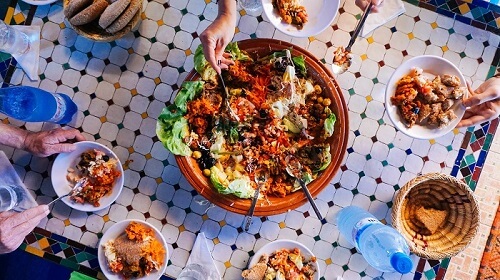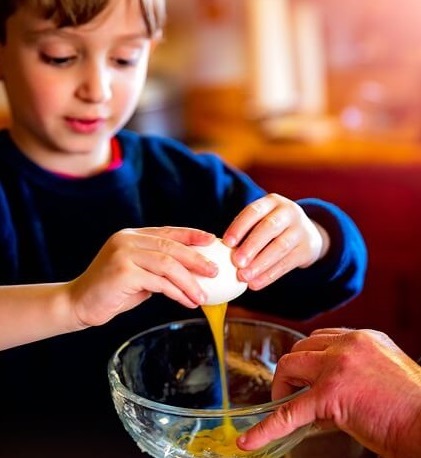May 5th, 2017
Top 5 Most Important Family Eating Behaviours
Why is family nutrition so important? Because to have vibrant family, all members need to work together! While your schedules and choices may vary, it IS possible to have the whole family eating in a very synchronized way.
The way the whole family behaves around food and eating is key to having children who are nourished and have positive and consistent eating behaviours.
Being consistent and in-sync with each other builds on healthy habits for adults and kids at the same time. Kids become happier eaters and parents can get automatic disease prevention without effort. It’s a total win-win.
What are the top 5 most important family eating behaviours?
1. Eat Together!
We are all incredibly busy and eating together as a family may not be possible all the time. That being said, there are advantages to having the whole family eat together as a unit.
Studies have shown this is very protective and beneficial habit; children that come from homes where eating meals together is a regular occurrence have much lower rates of depression, substance abuse and risky sexual behaviours compared to children that eat alone or with friends.
For babies, eating as a family creates positive feedback that food is safe and something that should be enjoyed, and it decreases challenging eating behaviours in the long term.
These are just some of the reasons why it’s so important to eat together as a family whenever possible, even if you only have half of your family present.
2. Eat the same foods as one another!
It can be tempting to try and cater to everyone’s needs and wants at mealtimes; we as humans living together are influenced in many ways through our day about food.
Aside from true allergies, try to encourage all members of the family to eat the same meals.
This has a significant impact for babies and young children due to the human ancestry of living and surviving in tribes. We are meant to eat in together in groups and share food and the experience.
If children watch their leaders (parents) eat foods that are healthy and nutritious, little tribe members will want to do the same to remain strong and connected to the group.
3. Avoid Labels! (Don’t call anyone “picky”)
It can feel helpful to define our family members by perceived likes and dislikes, but when it comes to food and eating, you want to reduce or eliminate the use of labels.
Calling a baby or child or even an adult “picky” or “fussy” reinforces those ideas, it isn’t helpful, and it can promote or make-worse those behaviours.
Some studies have shown negative focus and labelling in childhood can increase the risk of disordered eating behaviours and patterns in adolescence and adulthood. Instead of labelling, focus on providing a role-model for the behaviours you want to see more of.
Is your child or an adult less inclined to enjoy vegetables? No worries, vegetables should still be served and offered, even if in very small quantities at each meal. If someone doesn’t eat theirs, don’t comment on it. And no mention of whether we love or hate foods at the table…eating is not black and white, so you want to encourage less judgmental attitudes.
You want as much positive reinforcement as possible when it comes to healthy eating patterns in the family.
4. Make food together!
This is somewhat of a lost art these days it seems (sigh). Shopping for and making food together as a family is a great opportunity to learn about each other, learn how to prepare and cook food and it IS a form of quality time!
There is intense pressure on families between school, work and activities to find and focus on quality time to spend together. The struggle is REAL.
Preparing food as a family is the perfect opportunity to spend some quality time together! You can check in with each other about your days, learn a bit about each other and MOST MOST importantly, share a crucial life-skill with your children.
5. Serve Small-to-Large!
Many children and even many parents are HUNGRY (to the point of HANGRY) by the time dinner is on the table.
When we’re hungry we may think we need a huge portion of food, larger than what we can eat, to keep us from starving, but it’s a huge mistake to over-serve.
Babies and children can be very overwhelmed by huge portions of food, and this can discourage them from trying new foods or eating at all. Large portions can even produce feelings of fear and anxiety in some children. Adults will likely eat more than metabolically needed when served big portions, which can lead to fat gain. Taking care of yourself, your weight and your health doesn’t become easier after having kids.
For both children and adults, there is an unspoken “finish your plate” message that plates must be cleared, and this is a HUGE no-no. Serve small portions of all foods in equal proportion. Let anyone at the table know that they can have more should their body tell them they need it.
Keep meals to around 20 minutes, which is enough time for our brain to tell us we are full. If anyone still needs more food, they can have more, but it’s likely by that time, little people have already dashed away to play!
The Bottom Line
Working as a family to create healthy eating structures is just as important as the foods we put in our body. Help your children eat healthy by involving them in the preparation of food; it is a crucial life-skill to have. And remember, these regular everyday moments ARE quality time!



